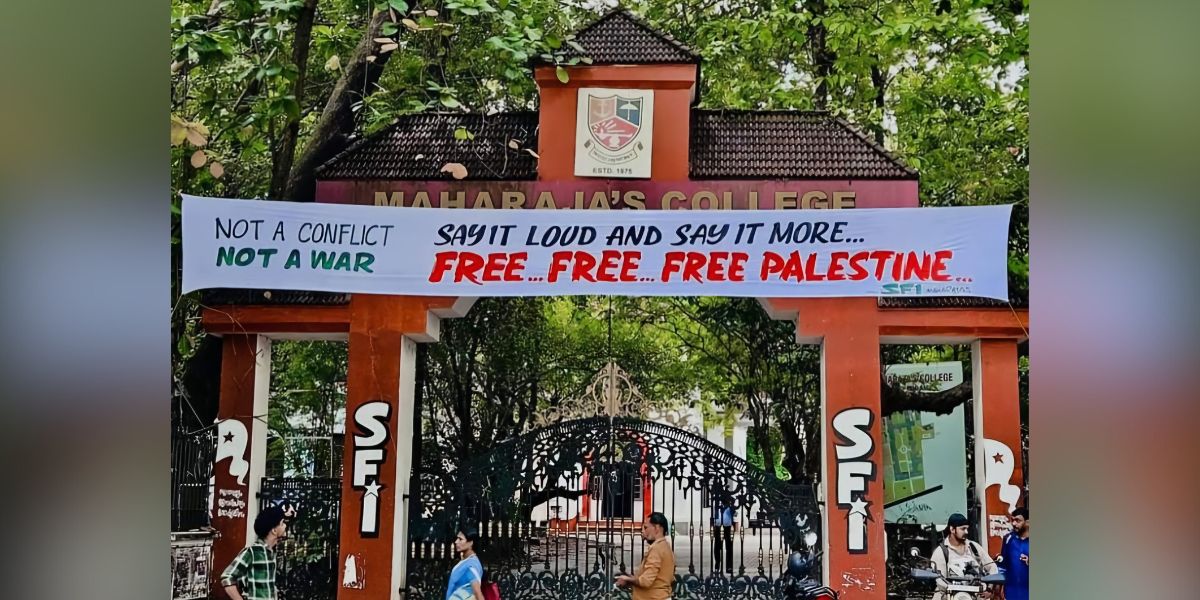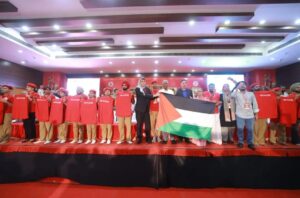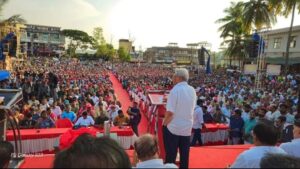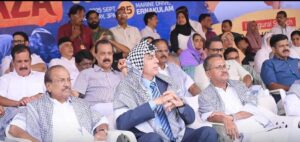Published Sep 27, 2025 | 9:00 AM ⚊ Updated Sep 27, 2025 | 9:00 AM

A poster supporting the Palestinian cause at the entrance of Maharaja's College, Ernakulam.
Synopsis: Historically, Kerala has a legacy of unwavering support for the state of Palestine. From the state government to political parties, youth movements, cultural collectives, and grassroots organisations, Kerala has consistently raised its voice for Palestine, framing it as a struggle for human rights and an act of defiance against imperialism.
Thousands of miles separate Kerala from Palestine, yet the bond between the former and the latter runs deep. In this small southern state of India, solidarity with Palestine is not an occasional gesture — it is a recurring expression of empathy, political conviction, and resistance against injustice.
From the state government to political parties, youth movements, cultural collectives, and grassroots organisations, Kerala has consistently raised its voice for Palestine, framing it as a struggle for human rights and an act of defiance against imperialism.
As Israel intensifies its offensive, Kerala once again stands firm, continuing a legacy of unwavering support.
But the question remains — why does Palestine resonate so strongly in Kerala?
Right-wing groups often dismiss Kerala’s solidarity with Palestine as mere political tokenism aimed at appeasing the state’s sizeable Muslim population. While that perception carries a sliver of truth, it only scratches the surface.
The roots of Kerala’s empathy run much deeper — woven through centuries of trade and cultural exchanges with West Asia, reinforced by the Malayali diaspora in the Gulf region, and shaped by the Left’s enduring tradition of internationalist politics.
Add to this the religious connect felt by Kerala’s Muslim community, the state’s high political and social awareness, the role of a vibrant press, and the intellectual culture nurtured by literary circles and reading clubs, and the picture becomes far richer.
Solidarity with Palestine in Kerala is not just about identity —it is about history, ideology, and lived experience.
Dr MV Bijulal, Chairperson of the Centre for West Asian Studies at Mahatma Gandhi University, told South First: “The Palestine issue has always had a strong presence in Kerala’s public sphere. In fact, it has often captured the imagination of Keralites more than the unrest in our immediate neighbourhood, like Sri Lanka. This connection is not accidental — it dates back to India’s freedom struggle, when the cause of Palestine was actively discussed.”
In 1938, Mahatma Gandhi himself underlined its moral significance, famously saying, “Palestine belongs to the Arabs in the same sense that England belongs to the English or France to the French.”
That vision later became the foundation of India’s foreign policy. From the very first government, India consistently recognised the Palestinian cause.
In 1974, we became the first non-Arab country to recognise the Palestine Liberation Organisation (PLO) as the sole legitimate representative of the Palestinian people. In 1988, India was among the first to recognise the Palestinian state.
“Kerala, which played a prominent role in the national movement, closely followed these developments. We are not an ignorant society when it comes to Palestine. The state has always been internationally connected, with deep ties to West Asia, and with cultural and historical bonds with both Arabs and Jews. Naturally, any developments from that region immediately resonate here,” Bijulal pointed out.
There is also a strong literary and intellectual dimension. Globally, Edward Said’s The Question of Palestine (1979) gave the struggle of Palestine wider visibility.
However, in Kerala, awareness came even earlier — back in 1930, when Muhammed Kannu published Palestine Prashnam (Palestine issue) in Malayalam.
“This reflects our long-standing political literacy. In fact, Palestine finds space even in our universities—within syllabuses, dissertations, and theses,” he added.
But beyond scholarship, there is also a romantic side to the issue. The Left, in particular, has always celebrated the idea of resistance against invasion.
For people here, Palestine became more than a geopolitical issue — it became a metaphor for resistance against power, capitalism, and imperialism.
“True, most Keralites may not be fully aware of the complex and diverse political landscape of the Israel–Palestine conflict. But they instinctively see Palestine as a story of courage, defiance, and the will to resist domination. That is why it continues to capture Kerala’s imagination,” Bijulal said.
Kerala’s historical, cultural, and political connections with West Asia have ensured that developments in the region, particularly the Palestinian cause, continue to find resonance in the state.
“Kerala’s connection with the Arab region developed historically through trade,” said Dr Rajeevan Kunnath of the Department of Islamic and West Asian Studies, Thunchath Ezhuthachan Malayalam University, to South First.

From the solidarity session with Palestine and Cuba at the 25th Congress of the CPI at Chandigarh on 25 September.
“That influence through traditional trade got affected when the European forces came. However, following independence, these ties became stronger — migration played a significant role in this development. Another point is that when we look at the Arab region, they too had undergone colonialism, so a common factor of anti-colonialism is there. That’s also a connection factor,” he added.
According to him, Kerala’s strong Leftist tradition also shaped the state’s solidarity.
“In a state like Kerala, where the Leftist ideals have a larger influence, the cause of Palestine got its prominence. The Left parties also disseminated the cause of Palestine. But nowadays, some forces want to connect Palestine only with Muslims, which is out of ignorance. Palestine is not an issue associated only with Muslims — though the territory has a larger Muslim population, there are also Jews, Christians, as well as minorities,” he highlighted.
Prof. Ashraf Kadakkal of the Department of Islamic History at the University of Kerala highlighted India’s long-standing diplomatic stance.
“From Nehru’s period onwards, India has been with the Palestinian cause. The political parties also supported the Palestinian cause. Media, intellectuals, and public opinion shaped the minds of people to stand with Palestine. We still consider the Palestine issue from a humanitarian angle,” he stated.
He pointed out that Kerala’s unique social and political fabric amplified this support.
“As we have strong ties with the Gulf region, developments there influence us. Another point is that Keralites are mostly politically sensitive and at the same time politically aware. Our society gave space to political leaders and intellectuals, and they took a stance supporting Palestine and influenced the collective mind,” Ashraf told South First.
Both scholars agree that Kerala’s expatriate connections, literacy movement, and vibrant vernacular media continue to keep the discourse alive. As Dr Rajeevan summed it up: “Why the vernacular media still discuss the Palestine issue is because people here still have an ear for listening to it.”
Former diplomat TP Sreenivasan told South First that Kerala’s solidarity with Palestine has always been intense — “as strong as India’s, if not a little stronger.”

Former CPI(M) General Secretary Sitaram Yechury inaugurating a Palestine Solidarity meeting in Cherkala, Kasaragod district in 2023. (Supplied)
“India–Palestine relations go back to Mahatma Gandhi’s time. Initially, we didn’t even recognise Israel. It was only in 1992, after the Cold War, that India established ties with Israel to improve relations with the United States. Since then, our engagement with Palestine has somewhat lessened. Still, India continues to recognise Palestine as a nation. That is why, while most countries addressed Yasser Arafat as chairman of the Palestine Liberation Organisation (PLO), India called him the President of Palestine,” he said.
On Kerala’s position, Sreenivasan pointed out that the state’s large Muslim population has been a strong factor in sustaining Palestine solidarity. “But nowadays, it is not just about faith or history. It has also become part of political mobilisation, especially with elections in sight,” he added.
Dr Rajeevan and Prof Ashraf also noted that the role of the Muslim population often shapes political parties’ engagement with Palestine solidarity. However, they cautioned that at times, the parties’ actions risked sending the impression that the cause is limited to the Muslim community alone.
Over the past decade, they observed, a subtle shift has taken place: Right-wing forces have increasingly framed solidarity with Palestine in a way that resonates specifically with Muslims.
According to Prof Ashraf, the rise of Islamophobia in the state has also influenced the nature and perception of this solidarity, shaping both discourse and participation.
Amid the renewed escalation of Israeli attacks on Palestine, Kerala has once again become a stage for solidarity gatherings.
Political parties, civil society groups, and cultural institutions are amplifying their support for the Palestinian cause through public programmes.

Palestine Ambassador to India Abdullah Abu Shawesh at IUML’s Palestine Solidarity programme in Ernakulam on 25 September.
On 25 September, the Indian Union Muslim League (IUML) organised a Palestine Solidarity Conference at Marine Drive, Ernakulam, drawing a large crowd. The event was graced by Palestinian Ambassador to India, Abdullah Mohammed Abu Shawesh, who lauded India’s long-standing commitment to Palestine.
Another major event, convened by the Kerala State Media Academy with the backing of the state government, is scheduled for 29 September.
Kerala’s political spectrum has historically been vocal about Palestine. In 2023, both the Congress and the CPI(M) hosted massive solidarity programmes.
Earlier this year, the CPI(M)’s 24th Party Congress (April) passed a resolution condemning Israel’s “genocidal attacks on Gaza,” while the CPI’s 25th Party Congress (September) reaffirmed solidarity, including support for the right of return and the right of Palestinians to live in peace and dignity in their homeland.
Speaking at the IUML’s event, Ambassador Abu Sawesh emphasised that India has consistently supported Palestine — from Mahatma Gandhi and Jawaharlal Nehru to successive governments in New Delhi.
“India has stood with Palestine since the 1930s. The two countries have always had strong ties. Just a few days ago, the Narendra Modi government voted in favour of Palestine at the United Nations. Not only that, India is helping us with many projects, including a hospital. We are satisfied with that. India is always ready to listen to Palestine,” the Ambassador told the gathering.
He stressed that the Palestinian issue is not a religious conflict but a humanitarian and international legal question.
“It is not a problem between Muslims and Jews. Jews and Christians have also helped the Palestinian struggle. Gandhi always stood by us, Nehru was central to our cause, and the Gandhi family has supported us consistently. India was the first country outside the Arab and Muslim world to recognise Palestine. The current government also stands with us. India and Palestine share a human history,” he said.
The Ambassador underlined that Palestine does not expect India to compromise its bilateral relations with other nations but deeply values India’s support in international forums and development projects.
With Kerala’s political parties and cultural institutions once again rallying under the banner of solidarity, the state continues to play a visible role in keeping the Palestinian cause alive in India’s public discourse.
(Edited by Muhammed Fazil.)

